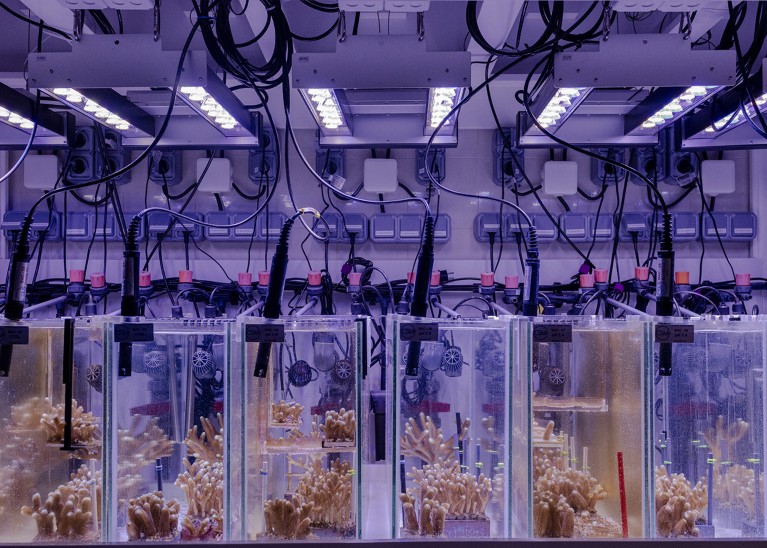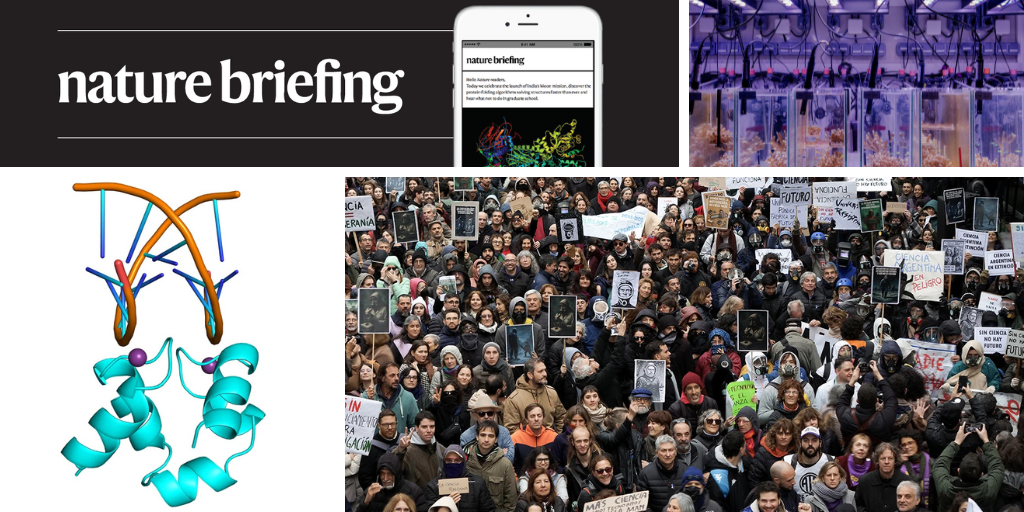You have full access to this article via your institution.
Hello Nature readers, would you like to get this Briefing in your inbox free every day? Sign up here.

Credit: Kasia Strek for Le Monde
For the past 14 years, researchers at the Monaco Scientific Centre have been growing Stylophora pistillata coral in tanks and subjecting it to acidic conditions, hoping to better understand the effects that future ocean acidification will have on reefs. This photo of the experiment is part of photojournalist Kasia Strek’s series Repairing the Earth, which won the Sony World Photo Award for Sustainability.
See more of the month’s sharpest science shots, selected by Nature’s photo team.
More than 1,000 scientists took to the streets in Argentine cities on Wednesday to protest the collapse of science in the country. Activists say that this ‘scienticide’ was initiated by the administration of President Javier Milei, who took office in late 2023. Since then, Milei has made massive cuts to government spending. Research funding has completely stopped, says physicist Fernando Stefani. “It hasn’t been fulfilled in any way — zero,” even for research contracts that had already been approved and were in progress, he said.
Scientists have discovered an ancient protein that has the rare property of being ‘ambidextrous’ — it can function in mirror-image forms. The protein contains a structure that’s symmetrical around an axis, which allows both ‘left-handed’ and ‘right-handed’ versions to bind to normal and mirror-image DNA. Why the structure is ambidextrous is unclear, but “a crazy explanation” is that it could have evolved when ‘mirror life’ — containing left-handed nucleic acids and right-handed proteins — existed on Earth, says protein historian Liam Longo.
Reference: Angewandte Chemie paper
Features & opinion
As Singapore’s economy grows, green spaces, such as areas of rainforest, face continual threats from urban development. In an attempt to preserve these spaces, and the wildlife that live in them, the Singaporean government is collaborating with academics to develop programs such as species-specific working groups and tree-planting initiatives. But these projects aren’t without their controversies. Some researchers say that collateral damage from certain projects could negate their intended impact. Others argue that what’s being preserved doesn’t represent local flora. “It’s not typically what people would really think of as ‘nature’,” says urban environment researcher Harvey Neo.
This article is part of Nature Spotlight: Singapore, an editorially independent supplement.
Space is a surprisingly smelly place, says astrobiologist and perfumer Marina Barcenilla. The cloud layers of Jupiter, for example, would range in smell from marzipan to cat urine. In fact, celestial bodies would all have their own unique smell, which scientists can recreate by mixing the chemicals they detect in these bodies. These olfactory clues can give us details on the make-up of the Universe, says Barcenilla, and could even point us in the direction of where to look for extraterrestrial life.
Novice archaeologists struggle to understand the People from Before in the latest short story for Nature’s Futures series.
Today, Leif Penguinson is lolling around Lago das Fadas (or Fairy Lake in English) in Tijuca National Park, Brazil. Can you find the penguin?
The answer will be in Monday’s e-mail, all thanks to Briefing photo editor and penguin wrangler Tom Houghton.
This newsletter is always evolving — tell us what you think! Please send your feedback to [email protected].
Thanks for reading,
Jacob Smith, associate editor, Nature Briefing
Want more? Sign up to our other free Nature Briefing newsletters:
• Nature Briefing: Careers — insights, advice and award-winning journalism to help you optimize your working life
• Nature Briefing: Microbiology — the most abundant living entities on our planet — microorganisms — and the role they play in health, the environment and food systems
• Nature Briefing: Anthropocene — climate change, biodiversity, sustainability and geoengineering
• Nature Briefing: AI & Robotics — 100% written by humans, of course
• Nature Briefing: Cancer — a weekly newsletter written with cancer researchers in mind
• Nature Briefing: Translational Research — covers biotechnology, drug discovery and pharma


